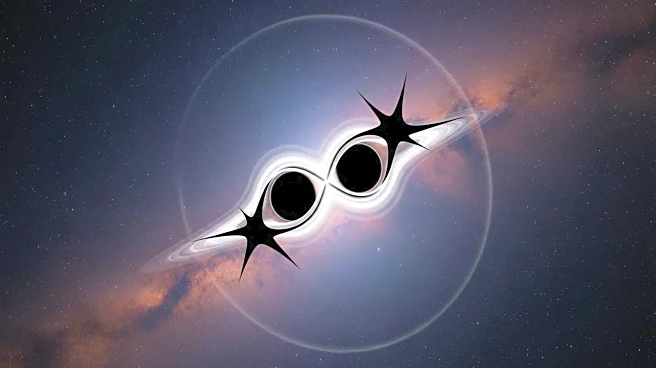What's Happening?
Kareem El-Badry, an astrophysicist, is making significant strides in the study of binary star systems, black holes, and other stellar phenomena. El-Badry utilizes astronomical datasets and theoretical modeling to explore how stars form, evolve, and interact. His work has led to the discovery of overlooked dormant black holes in our galaxy and new classes of stars. El-Badry developed a method for identifying binary stars in spectrographic datasets, revealing over 3,000 binary systems in the Milky Way through the APOGEE project and more than one million binaries using Gaia mission data. His research has also corrected previous misconceptions about dormant black holes, showing that some were actually stars stripped of their outer hydrogen layer. El-Badry's method for identifying dormant black holes in wide binaries has led to the discovery of two such black holes, including the nearest known black hole to Earth.
Why It's Important?
El-Badry's research is crucial for advancing the understanding of stellar astronomy and the dynamics of celestial bodies. By identifying binary star systems and dormant black holes, his work provides insights into the formation and evolution of stars, which are fundamental to understanding the universe. The ability to accurately identify and characterize these systems can lead to more precise models of galaxy formation and the lifecycle of stars. This research has implications for astrophysics, potentially influencing future space observation missions and the development of new technologies for studying the cosmos. The discoveries made by El-Badry could also impact theoretical models used by scientists worldwide, enhancing the accuracy of predictions about stellar behavior and interactions.
What's Next?
As more astronomical data becomes available and new observation missions are launched, El-Badry is expected to continue expanding knowledge about the universe. His methods for analyzing stellar data could be applied to future datasets, potentially leading to further discoveries of binary systems and dormant black holes. The ongoing development of space observation technology will likely provide El-Badry and other astrophysicists with new opportunities to explore the cosmos, refine existing theories, and uncover new phenomena. Collaboration with other researchers and institutions may also enhance the scope and impact of his work, contributing to a deeper understanding of the universe's complexities.
Beyond the Headlines
El-Badry's work highlights the importance of data analysis and theoretical modeling in modern astrophysics. The ability to extract meaningful insights from vast datasets is crucial for advancing scientific knowledge and solving longstanding mysteries in the field. His research underscores the potential for innovative approaches to transform understanding of complex systems, offering a model for other scientific disciplines. The ethical considerations of space exploration and data usage also come into play, as researchers must balance the pursuit of knowledge with responsible stewardship of resources and technology.









